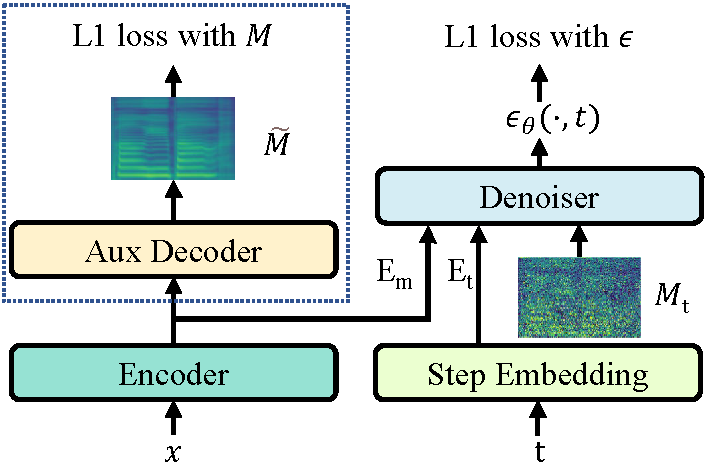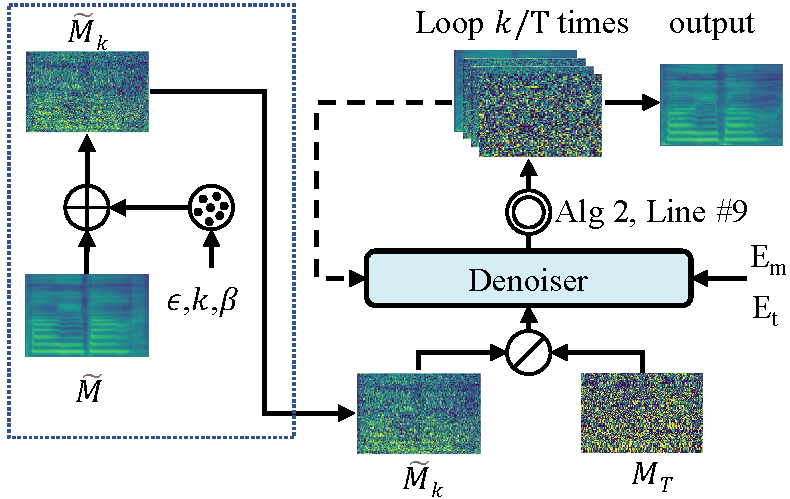This is a cleaner version of Diffsinger, which provides:
- fewer code: scripts unused in the DiffSinger are marked *isolated*;
- better readability: many important functions are annotated (however, we assume the reader already knows how the neural networks work);
- abstract classes: the bass classes are filtered out into the "basics/" folder and are annotated. Other classes inherent from the base classes.
- better file structre: tts-related files are filtered out into the "tts/" folder, as they are not used in DiffSinger.
- (new) Much condensed version of the preprocessing, training, and inference pipeline. The preprocessing pipeline is at 'preprocessing/opencpop.py', the training pipeline is at 'training/diffsinger.py', the inference pipeline is at 'inference/ds_cascade.py' or 'inference/ds_e2e.py'.
TBD
# Install PyTorch manually (1.8.2 LTS recommended)
# See instructions at https://pytorch.org/get-started/locally/
# Below is an example for CUDA 11.1
pip3 install torch==1.8.2 torchvision==0.9.2 torchaudio==0.8.2 --extra-index-url https://download.pytorch.org/whl/lts/1.8/cu111
# Install other requirements
pip install -r requirements.txt- (Required) Get the pretrained vocoder from the DiffSinger Community Vocoders Project and unzip it into
checkpoints/folder, or train a ultra-lightweight DDSP vocoder first by yourself, then configure it according to the relevant instructions. - Get the acoustic model from releases or elsewhere and unzip into the
checkpoints/folder.
This pipeline will guide you from installing dependencies to formatting your recordings and generating the final configuration file.
The following is only an example for opencpop dataset.
export PYTHONPATH=.
CUDA_VISIBLE_DEVICES=0 python data_gen/binarize.py --config configs/acoustic/nomidi.yamlThe following is only an example for opencpop dataset.
CUDA_VISIBLE_DEVICES=0 python run.py --config configs/acoustic/nomidi.yaml --exp_name $MY_DS_EXP_NAME --reset python main.py path/to/your.ds --exp $MY_DS_EXP_NAMESee more supported arguments with python main.py -h. See examples of *.ds files in the samples/ folder.
Please see this documentation before you run the following command:
python onnx/export/export_acoustic.py --exp $MY_DS_EXP_NAMESee more supported arguments with python onnx/export/export_acoustic.py -h.
OpenUTAU, an open-sourced SVS editor with modern GUI, has unofficial temporary support for DiffSinger. See OpenUTAU for DiffSinger for more details.
See the original paper, the docs/ folder and releases for more details.
Below is the README inherited from the original repository.



This repository is the official PyTorch implementation of our AAAI-2022 paper, in which we propose DiffSinger (for Singing-Voice-Synthesis) and DiffSpeech (for Text-to-Speech).
| DiffSinger/DiffSpeech at training | DiffSinger/DiffSpeech at inference |
|---|---|
 |
 |
🎉 🎉 🎉 Updates:
- Sep.11, 2022: 🔌 DiffSinger-PN. Add plug-in PNDM, ICLR 2022 in our laboratory, to accelerate DiffSinger freely.
- Jul.27, 2022: Update documents for SVS. Add easy inference A & B; Add Interactive SVS running on HuggingFace🤗 SVS.
- Mar.2, 2022: MIDI-B-version.
- Mar.1, 2022: NeuralSVB, for singing voice beautifying, has been released.
- Feb.13, 2022: NATSpeech, the improved code framework, which contains the implementations of DiffSpeech and our NeurIPS-2021 work PortaSpeech has been released.
- Jan.29, 2022: support MIDI-A-version SVS.
- Jan.13, 2022: support SVS, release PopCS dataset.
- Dec.19, 2021: support TTS. HuggingFace🤗 TTS
🚀 News:
- Feb.24, 2022: Our new work, NeuralSVB was accepted by ACL-2022
. Demo Page.
- Dec.01, 2021: DiffSinger was accepted by AAAI-2022.
- Sep.29, 2021: Our recent work
PortaSpeech: Portable and High-Quality Generative Text-to-Speechwas accepted by NeurIPS-2021.
- May.06, 2021: We submitted DiffSinger to Arxiv
.
conda create -n your_env_name python=3.8
source activate your_env_name
pip install -r requirements_2080.txt (GPU 2080Ti, CUDA 10.2)
or pip install -r requirements_3090.txt (GPU 3090, CUDA 11.4)tensorboard --logdir_spec exp_name |
Old audio samples can be found in our demo page. Audio samples generated by this repository are listed here:
Speech samples (test set of LJSpeech) can be found in demos_1213.
Singing samples (test set of PopCS) can be found in demos_0112.
@article{liu2021diffsinger,
title={Diffsinger: Singing voice synthesis via shallow diffusion mechanism},
author={Liu, Jinglin and Li, Chengxi and Ren, Yi and Chen, Feiyang and Liu, Peng and Zhao, Zhou},
journal={arXiv preprint arXiv:2105.02446},
volume={2},
year={2021}}
Our codes are based on the following repos:
Also thanks Keon Lee for fast implementation of our work.